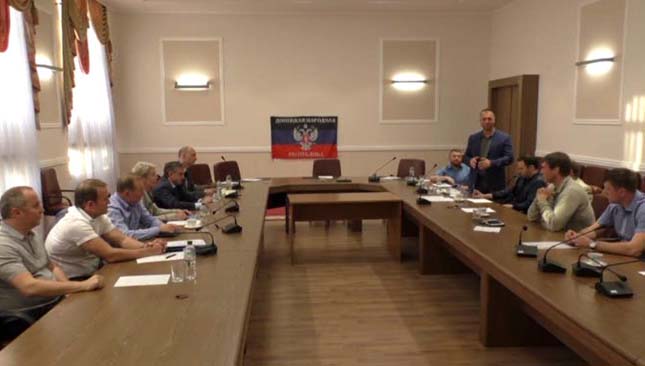Talks to reach a ceasefire and an eventual cessation of military conflict in southeast Ukraine took place in Donetsk city on June 23. Agreement was reached on a ceasefire to last until 10 am on June 27. Below is a news article on the talks, translated from the Worker Correspondent (‘Rabkor‘) Russian-language website.
News on June 25: Maria Matyushenko is released from detention. See report below.
The Ukraine government in Kyiv did not participate directly in the talks. It asked a former president of the country, Leonid Kuchma, to act on its behalf. President Petro Poroshenko said in a press release reported on Russia Today, “Leonid Kuchma’s participation indicates the Ukrainian president’s close attention to this mission”.
Neither the CBC or BBC news reports on the peace talks provide information of seven peace proposals advanced by representatives of the autonomous governments of Donetsk and Luhansk regions. Those proposals are detailed in the Rabkor article below.
Russia Today has a lengthy article on the talks. It mentions the seven proposals of the autonomy governments but does not explain their content.
A key source of news on Ukraine is the website of the recently-founded campaign in Britain Solidarity with the Antifascist Resistance in Ukraine. The campaign is urgently asking readers to write to the Ukraine government or its embassies and demand that the government ensure the safety of Maria Matyushenko. She is a member of the left wing group Borotba and was kidnapped from her apartment in the city of Dnepropetrovsk by unknown persons on June 24. For many months, Borotba’s offices and activities in cities throughout Ukraine have been attacked and closed down by rightist and fascist groups.
Lots of information on the situation in Ukraine is compiled on several pages of my website, ‘A Socialist in Canada’. One of those pages is Ukraine: translations and articles by other writers. Recent items posted to there include:
- Please consider me a separatist (For the right of peoples to self-determination), by Victor Shapinov of the Ukraine political association Borotba, and
- Donetsk and Luhansk republics in southeast Ukraine issue programs
Message on the website of Solidarity with the Antifascist Resistance in Ukraine, from Borotba association, June 25, 2014:
Comrades! Thanks to everybody for your concern and solidarity. Comrade Maria Matyushenko is released and safe now. She was detained by state security agents – so-called “anti-terror forces” – in the course of a search during which they grabbed all the mobile phones and computers of the family, including the Ipad of a 13 year old sister.
On the same day, there were other searches in Dnepropetrovsk. There are mass interrogations and detention of people accused only of their oppositional political views and criticism of the authorities in social-networks. State security agents act together with ultra-right militants in course of the detentions of dissenters.
* * *
Ukraine: The Donetsk People’s Republic does not reject beginning talks with Kiev
From the Rabkor (‘Worker Correspondent’) website, www.rabkor.ru, June 24, 2014, translation from the Russian by Renfrey Clarke
A genuine process of negotiations between Kiev and representatives of the Lugansk and Donetsk People’s Republics will be possible only if Kiev fulfills seven conditions set out by Oleg Tsarev, the Joint Chairperson of the People’s Front of Novorossiya.
This was stated by Prime Minister of the Donetsk People’s Republic Aleksandr Boroday, relaying the outcome of consultations held today, June 23, in Donetsk. Tsarev had listed the seven points, saying that once Kiev had fulfilled them it would be possible to discuss a peaceful resolution of the conflict.
The points are as follows:
1. Withdrawal from the territory of the Lugansk and Donetsk People’s Republics of the National Guard, of the armed formations of [oligarch Ihor] Kolomoysky and of the Right Sector, along with units of the Ukrainian Army guilty of killing peaceful civilians.
2. Payment by Kiev of compensation to the families of peaceful citizens killed in the fighting.
3. Payment by Kiev of compensation to residents of the republics for destruction of their housing.
4. Payment by Kiev of compensation to municipalities for damage inflicted by Ukrainian forces on communal infrastructure.
5. Payment by Kiev of compensation to the owners of industrial installations destroyed in the fighting.
6. Agreement by the President of Ukraine and by the parliaments of the Republics on a draft for a constitutional act defining the status of the People’s Republics.
7. Amnesties for all participants in the militias and for all political prisoners held in Ukrainian jails.
Boroday also stated that the militia would halt its military operations in response to the Kievan side beginning a cease-fire. “In response to a cease-fire by the Kievan side, we undertake to observe a truce. The duration of the truce will be until 27 June.”
He voiced the hope that monitoring of the truce would be organised by the Russian Federation and the Organisation for Security and Cooperation in Europe (OSCE). “We hope,” Boroday said, “that during the joint cease-fire we shall be able to reach agreement and proceed to conducting talks—or at least to begin consultations on conducting talks—aimed at a peaceful resolution of the conflict.”
The Prime Minister of the Donetsk People’s Republic emphasised that what took place in Donetsk on 23 June had been informal preliminary consultations, and that the question of such talks had not been under discussion.
It should be noted that the consultations on 23 June involved a tripartite contact group. The participants included Heidi Tagliavini, the special representative of the acting chairperson of the OSCE; Viktor Zurabov, the Extraordinary and Plenipotentiary Ambassador of the Russian Federation; Leonid Kuchma, Ukraine’s second, post 1991, president; Viktor Medvedchuk, head of the social organisation “Ukrainian Choice; Oleg Tsarev, leader of the ‘South-East’ movement, and also representatives of the Donetsk and Lugansk People’s Republics.



